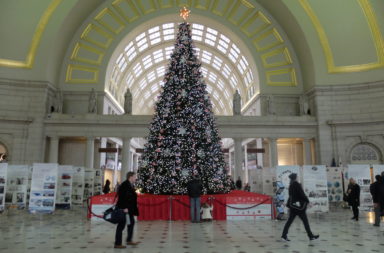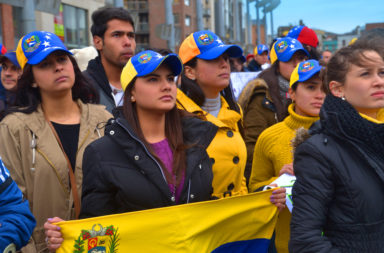Will the protests scheduled to take place throughout the month be enough to oust the government?
Ever since the winning of the opposition in the pools last year, the pressure to hold a referendum to revoke Mr. Nicolás Maduro (picture) from the presidency became one of the few similarities among the fragmented interests of the groups against the chavismo.
Venezuela´s economic indicators show a country on the edge of collapse, with inflation rates reaching 700% and the economy expected to sink by 10% by the end of 2016.
Such indicators would make sense in a country going through a war, but they are a combination of many bad decisions of a government that is losing the capacity to respond to a social collapse.
Click on the button to load the content from www.flickr.com.
Venezuela is facing economic problems mainly given the fall on oil and commodity prices worldwide, but the incapacity to diversify the economy is the major cause that intensified the effects of the crisis that the country currently goes through. Over the last decades, Venezuela has been suffering from the Dutch disease, with the (back then) profitable oil sector succeeding over other sectors of the economy. The coutry relied mailny upon imports to address the food and medicine demand. Amidst a severe exchange crisis, the shortages became a reality very quickly, escalating to the social tension currently in place.
Instead of look for solutions within the society and through international aid, the president locked himself with the few but powerful supporters of its regime – namely the army and other government institutions controlled by the chavistas – and has been governing through presidential decrees, caring less and less about displaying an image of a democracy.
What is at stake in the referendum?
The call for the referendum is the only plan agreed within the distinct groups of the opposition to bring a change in the government. There is no clear way to follow after taking out Mr. Maduro from office, since it is unclear who would take his place among the opposition members. According to a recent poll, 84% would vote to remove Mr Maduro from office. However, many factors in a country that lacked true democratic structures for years need to be considered in order to assess the possible results of the referendum and the political scenarios for the country.
“20 days left to mobilize millions and leave our mark! Venezuela will always be worth it!” posted an opposition leader, Mr. Henrique Capriles, in his instagram account.
Biased institutions may prevent a democratic outcome
Over the last decade, the political influence of the Executive government spilled over other institutions. During the years of Mr. Hugo Chavez in power, the Judiciary, the National Electoral Council (CNE, responsible for calling the referendum) and the Public Prosecutor – institutions that should be independent – have been slowly aligning with the Executive´s position. Before the recent legislative elections, the Congress was also under the President´s influence. Although part of the increasing influence is explained by the boycott of the opposition to previous elections, the increasing alignment with the Executive gives Venezuela a more dictatorial face than a democratic one.
“The recall referendum can and should be held in 2016! There is no justification, ethical, historical, legal, political or technical for not doing so” tweeted another opposition leader, Mr. Leopoldo Lopez.
This is being translated in the design of the referendum. The constitution sets a bar of 20% of the nation´s support to call for a referendum. CNE´s understanding, biased towards the government´s will, is that this threshold needs to be reached by all of the 24 states of the country. Apart from that, the Council will provide less ballot boxes and operate only during seven hours in the day of voting, preventing people to properly cast their vote. Apart from dodgy rules, the referendum will also take place in a society that is eager for a change, but frightened about possible retaliations that may come up from groups linked to the government.
What happens next?
There are two possible scenarios for Venezuela: one towards a greater democratization and the other to a deeper autocratization. If the opposition is successful in calling the referendum, they will have also to pressure the electoral authority to run it before the 10th of January. In case it is done before this deadline, Venezuelans get to choose directly a new president. If it happens after this date, the vice-president, position currently held by Mr. Aristóbulo Istúriz, takes office. The referendum will hardly be held before January, and either continuing in Maduro´s hands or going to his vice president, the main guidelines of the chavismo have great chances of continuing in power.
The referendum does not mean that the end of the political crisis is near. Reforms are needed and Maduro does not seem capable of delivering them. If the government cannot bring a new proposal to the table, the system will collapse as the country goes into a deeper economic crisis – risking a default, which the economic team is fighting hard to avoid. With an economy basically dependent on oil, the recovery can come if the prices go up again – benefiting who is in power. Therefore, the current government seems to struggle to remain in power as it waits for a miracle to happen in international markets, since the much needed economic reforms and investments in the country are unlikely to be done in a situation of juridical, political and economic instability.
On the other hand, a longer instability period may force the chavismo out of the government either before or at the 2019 Presidential elections. However, without a clear cohesion among the opposition, it is difficult to know who will come up as an alternative to the country. Venezuela needs a strong hand for the needed reforms, a willingness to accept international aid and maybe a regional effort coordinated mainly among Brazil, Colombia and Argentina to overcome this difficult situation. However, after more than a decade of state control, lack of investments in the national industry and social fragmentation, the country will hardly cure its wounds simply by changing who is in command.





